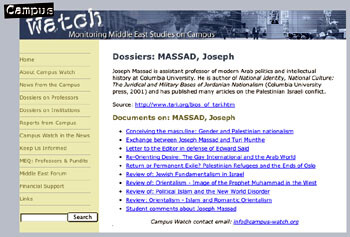The Electronic Intifada 27 September 2002
Following the launch of “Campus Watch”, a new Daniel Pipes project to monitor the views of Middle East Studies lecturers on campuses, EI’s Nigel Parry interviewed academic Joseph Massad about how he felt to be one of the professors on which a “dossier” had been opened.
On 29 September 2002, EI noticed that the “dossiers” appear to have been removed from the Campus Watch website, although the basic content and aims of the site remain unchanged.

Campus Watch’s dossier on Columbia University professor Joseph Massad. Anyone reading the linked articles by Massad, expecting to find something ‘untoward’, will be disappointed. The issue Campus Watch has with academics such as Massad appears to be that their views on the Middle East do not concur with the lurid and racist views of Arabs and Islam that Pipes and his ilk subscribe to. Campus Watch assaults academic freedom by encouraging the hounding of faculty members for “divergent” views, something that will do nothing to ensure a real world education experience for students. Welcome to the standard machinations of the pro-Israeli monolith. (EI)
Joseph Massad: No, I was not aware at all. I did know about the articles written by Kramer and Daniel Pipes and that they were featured on their website. I had not realized that they had developed it in this intricate fashion as a GESTAPO file.
Nigel Parry: What are your initial feelings about the project?
Joseph Massad: I am of course digusted by these policing operations by failed academics of the caliber of Kramer and Pipes who opted for a propaganda role on behalf of the racist colonial settlement that they support. However, their marginalization in academia continues despite their valiant efforts to obtain respectability.
It is interesting to note that the Kramer and Pipes have not done their homework well. In my “dossier,” they only list articles of mine and reviews that are critical of the Palestinian national movement and of an anti-Zionist Israeli writer and other writings unrelated to Israel. It is testament to their stupidity that they have failed to list my many critical articles of Israel and its policies. Then again, such poor research abilities on their part may explain why neither of them is employed at a respectable academic institution and work in the field of propaganda.
Nigel Parry: Have you noticed any monitoring on your campus? Have other faculty reported any such monitoring?
Joseph Massad: I have been targeted by the pro-Israel groups on campus and off campus due to my teaching a course called “Palestinian and Israeli Politics and Societies”. Although I have taught the course three times since I began at Columbia, last Spring (2002), some students in my class (about 4 out of 85 or so) attempted to harrass me and the class by constant interruption of the lecture, which of course I allowed for a while so that they would not feel silenced. My policy is always to have students, whatever their political coloring, to feel comfortable to express their views freely in class.
Although most other students complained about these few students openly and privately, I continued to let them interrupt when they felt that they had a different view. One of them, however, began to orchestrate a campaign against me starting a petition to get me fired. She later dropped the project and informed me that she had been approached by people from outside the class, including faculty, from other departments who asked her to start the petition which she later droped and about which she expressed regrets to me.
Another student (a self-identified Likudnik) informed me of his worry that “they” were out to get me. He said that a medical school faculty member had approached him and told him to recruit other students and present an official complaint against me. The student told me that he felt that he was being recruited to have me “killed.” He refused insisting that I had the right to express my political views regardless of content.
In addition, a letter-writing campaign was orchestrated against me in the university newspaper (The Spectator) and at the School of International Relations newsletter, as a result of a lecture I gave on Israeli racism. Fortunately, I have many defenders who also wrote and defended me. The newspaper also joined in the campaign by misquoting me at a pro-Palestinian rally.
When I contacted the student journalist about the misquotation, she apologized profusely and informed me that she did not even attend the rally (I still have all her e-mails) and that she was given the information by another student journalist who allegedly attended. She apologized and tried valiantly to have the editors run a correction which they finally did two days later although the misquote is still paraded as a true quote by Kramer and Pipes in their articles which mention me, and they never mention that correction which the newspaper ran.
Moreover, the Israeli newspaper Ha’aretz also ran an article last March about a lecture I gave at Oxford University, an article that was written by a journalist who never attended the lecture. Ha’aretz agreed finally to run a letter to the editor I wrote, but despite their assurances to the contrary, they doctored my letter minimizing my complaint against them. This is aside from the cyber-terrorist attack that I have been subjected to along with my colleague Hamid Dabashi for the last month by some lunatic who has been trying to destroy our e-mail accounts. I had also received a death threat last May via e-mail about which I informed Columbia security. These are the more major of the things I was subjected to this year.
Nigel Parry: Do you feel this will affect academic freedom on campus? How?
Joseph Massad: Well, the idea behind this campaign is to terrorize faculty into following the Israeli line and to intimidate us by having us avoid addressing thes issues. It is important not to place the blame for this terror campaign on Pipes and Kramer as they are simply parts in a larger propaganda game orchestrated by the Israeli government and its US lobby. I trust that the university system and academia will always remain unwelcoming to the thought police, no matter who they are. I certainly remain impervious to their attempts. They buzz around like insects which on occasion may be irritating, otherwise, they only succeed in delegitimizing themselves.
Nigel Parry: Have you experienced pressure as a result of your views on the Middle East or any aspect of it? Has this come from the institution, faculty, students, or a mixture?
Joseph Massad: My departmental chair and many colleagues have expressed much solidarity and support with me. Indeed my chair is being subjected to a similar campaign. My students evaluations’ of my classes and their personal comments are full of support. Indeed, this comes from many Jewish and Zionist students who appreciate my classes and who defend me publicly and privately.
Nigel Parry: What other trends to quash free debate about the Middle East have you noted in your institution, if any?
Joseph Massad: The attempt is always to have an Israeli view represented when a Palestinian view is being presented and to oppose the expression of Palestinian views when Israeli views are presented. Last Spring, I recall that graduate students at the School of International Relations insisted on inviting me to express sympathetic views of the Palestinian struggle for independence after they had invited a Zionist speaker. The Zionist students, however, insisted after my talk on inviting yet another Zionist speaker after me for the sake of “balance.” These are the same old trends and they continue.
Nigel Parry: What do you think is the best antidote to this kind of project by the pro-Israel lobby?
Joseph Massad: One should expose all their campaigns. The pro-Israel lobby does much of its dirty work in the dark and is scared when its machinations are exposed. It is important to expose every attempt they make to terrorize a faculty member immediately. A faculty member should inform the department, the student press, etc.
Related Links:





